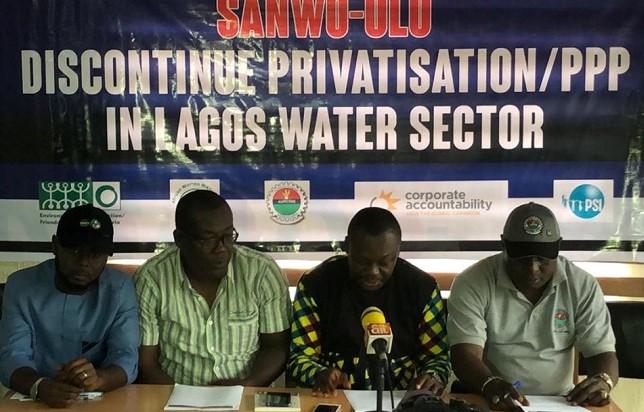Civil society, labour and grassroots groups have demanded that Governor Mr. Babajide Sanwo-Olu of Lagos State should halt its plans to privatise water.

The campaigners, who made the submission during a media briefing in Lagos on Wednesday, October, 23, 2019, said that reports in Global Water Intelligence – a business information for the private water industry – indicated that the Lagos government had pencilled the Adiyan II and Igbonla water works for privatisation.
Consequently, the Nigeria Labour Congress (NLC) and its affiliate, the Amalgamated Union of Public Corporations Civil Service Technical and Recreational Services Employees (AUPCTRE), have threatened for a showdown if the governor went ahead with the presumed privatisation plans.
The groups, who met in Lagos on the aegis of the Our Water, Our Right Coalition, said the reports in GWI published on October 17, 2019 was disturbing and indicates disrespect for the views of Lagos citizens and trade union groups that have marched since 2014 and expressly rejected privatisation of the water sector.
Speaking at the briefing, Philip Jakpor, Head Media & Campaigns at the Environmental Rights Action/Friends of the Earth Nigeria (ERA/FoEN), said that the updated details in the report showed that the Sanwo-Olu administration may not be different from his predecessors who were dead set on foisting the Public Private Partnership (PPP) model of water privatisation on Lagos citizens despite popular resistance.
Jakpor said that civil society, labour and grassroots groups were worried that the Lagos government had bought into the myth of the PPP water privatisation success story marketed by the World Bank Group, citing monumental failures in Nagpur, Manila and across Asia and Africa as glaring examples that should serve as red flag to the government.
The activist expressed worry that the World Bank and its private arm, the International Finance Corporation (IFC), had continued to market the PPP in the water sector, engaging in behind-the-curtain talks with the governments including Lagos State, albeit amid denials.
He maintained that the award of the 100 million gallon/day Igbonla project to Brio Resources Technologies and Acuamed should also elicit questions since Acuamed is tied up in an international corruption scandal and was recently under investigation by the Spanish government and the European Union’s European Anti-Fraud Office (OLAF).
Several executives of the company were said to have been arrested in 2016 in relation to the allegations and in April 2017, the Spanish Parliament called for reform and eventual replacement of Acuamed following the scandal.
Comrade Taiwo Opaleye, Branch Chair of AUPCTRE Lagos Council, spoke on the secrecy around the Lagos government privatisation plans, even as he added that the neglect of the existing waterworks in the state was deliberate to pave way for privatisation.
Opaleye alleged that the Iju, Adiyan and other waterworks in Lagos were deliberately starved of funds to pave the way for privatisation.
Secretary, NLC Lagos State Chapter, Comrade Abiodun Bakare, wondered why the Lagos government continues to shun critical voices including that of the victmised staff of the Lagos Water Corporation (LWC) and, instead, continues to fraternise with corporations with global infractions.
Bakare explained that the details in the GWI which emanated from the LWC management was surprising as there had been no formal discussion with staff on the status of the waterworks and awarded work.
The unionist said the publishing of the details in the GWI raises several questions and concerns, including why Lagos citizens must have to find out about plans to privatise their water from industry trade journals rather than from the government.
“There was no consultation with us and no recourse to our concerns that have been explicit from 2014 when the PPP idea was first muted, so it is shocking to observe the eagerness of the Lagos government to fraternize with corporations with questionable records.”
In his intervention, Achike Chude of the Joint Action Front (JAF) said that the water privatisation experiment in the water sector is a failed experiment that started in Great Britain under Prime Minister Margaret Thatcher‘s government in the early 1980s but has been repackaged and now promoted by the World Bank Group.
Chude explained that the water sector privatisation being promoted by the Lagos government is part of a growing recourse to privatisation, particularly the PPP model which, he alleged, was fraudulent since the private sector investors will not put in their funds.
“It is a pattern. We have seen it in the power sector. We have seen it with Visionscape and other companies who come to Nigeria with their brief cases and are taken to the bank by the government which stands as guarantor of the loans they collect.”
Chude warned that putting an indispensable gift of nature in the hands of a few individuals and powerful corporations would lead to violation of rights, poor service quality and a major social crisis.
“Governor Sanwo-Olu’s administration must hearken to the demands of Lagos citizens that it uphold the human right to water as an obligation of the government, representing the people. He must live up to his campaign promise to be a governor for the people of Lagos, not vested interests.”
Aside a halt to the PPP/Privatisation plans, the groups other demands are:
- Lagos water infrastructure should not be handed to transnational corporations like Veolia, Metito, Abengoa
- Disclosure of all IFC and World Bank activity and discussions with Lagos government officials regarding water, including formal and informal advisory roles.
- The Lagos government builds the political will to prioritise water for the people, through a comprehensive plan that invests public funds in the water infrastructure necessary to provide universal water access, which will create jobs, improve public health, and invigorate the Lagos economy.
- Increased budgetary allocation to the water sector
- Institution of Water Trust Fund that will expand public financing of the water sector.
